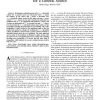Free Online Productivity Tools
i2Speak
i2Symbol
i2OCR
iTex2Img
iWeb2Print
iWeb2Shot
i2Type
iPdf2Split
iPdf2Merge
i2Bopomofo
i2Arabic
i2Style
i2Image
i2PDF
iLatex2Rtf
Sci2ools
TIT
2008
2008
Coding Theorems on the Threshold Scheme for a General Source
In this paper, coding theorems on the (t; m)-threshold scheme for a general source are discussed, where m means the number of the shares and t means a threshold. The (t; m)-threshold scheme treated in this paper encrypts n source outputs X n to m shares at once and is required to satisfy the two conditions that 1) X n is reproduced from arbitrary t shares, and 2) almost no information of X n is revealed from any t 01 shares. It is shown that the (t; m)-threshold scheme must satisfy certain inequalities including the limit inferiors in probability. One of the inequalities is closely related to the minimum length of the fair random bits needed to a dealer for realizing the (t; m)-threshold scheme. In addition, it is shown that a certain variation of Shamir's threshold scheme meets the two conditions. The same approach can be taken to the problems of Shannon's cipher system with the perfect secrecy and fixed-length source coding with vanishing decoding error probability. It is s...
-threshold Scheme | General Source | Paper | TIT 2008 |
Related Content
| Added | 15 Dec 2010 |
| Updated | 15 Dec 2010 |
| Type | Journal |
| Year | 2008 |
| Where | TIT |
| Authors | Hiroki Koga |
Comments (0)

